mirror of
https://github.com/LCTT/TranslateProject.git
synced 2025-01-07 22:11:09 +08:00
@runningwater @blueabysm @theo-l @weychen @ly0 @coloka @Medusar @mr-ping @KayGuoWhu @haimingfg @martin2011qi
83 lines
5.6 KiB
Markdown
83 lines
5.6 KiB
Markdown
What is good audio editing software on Linux
|
|
================================================================================
|
|
|
|
Whether you are an amateur musician or just a student recording his professor, you need to edit and work with audio recordings. If for a long time such task was exclusively attributed to Macintosh, this time is over, and Linux now has what it takes to do the job. In short, here is a non-exhaustive list of good audio editing software, fit for different tasks and needs.
|
|
|
|
### 1. Audacity ###
|
|
|
|
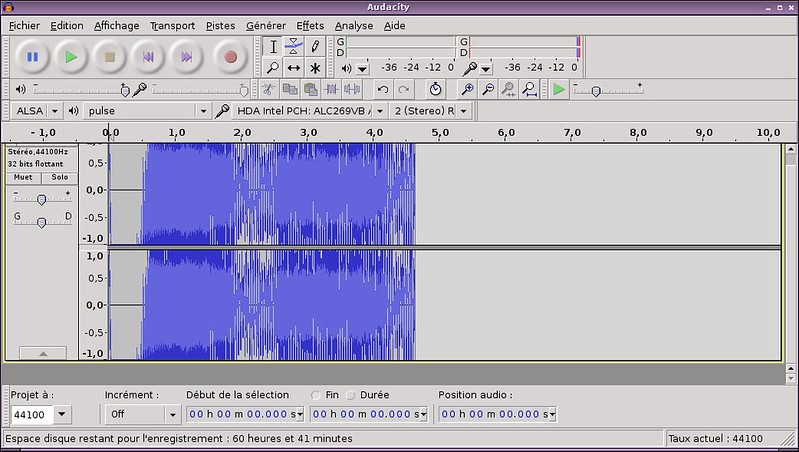
|
|
|
|
Let's get started head on with my personal favorite. [Audacity][1] works on Windows, Mac, and Linux. It is open source. It is easy to use. You get it: Audacity is almost perfect. This program lets you manipulate the audio waveform from a clean interface. In short, you can overlay tracks, cut and edit them easily, apply effects, perform advanced sound analysis, and finally export to a plethora of format. The reason I like it so much is that it combines both basic features with more complicated ones, but maintain an easy leaning curve. However, it is not a fully optimized software for hardcore musicians, or people with professional knowledge.
|
|
|
|
### 2. Jokosher ###
|
|
|
|
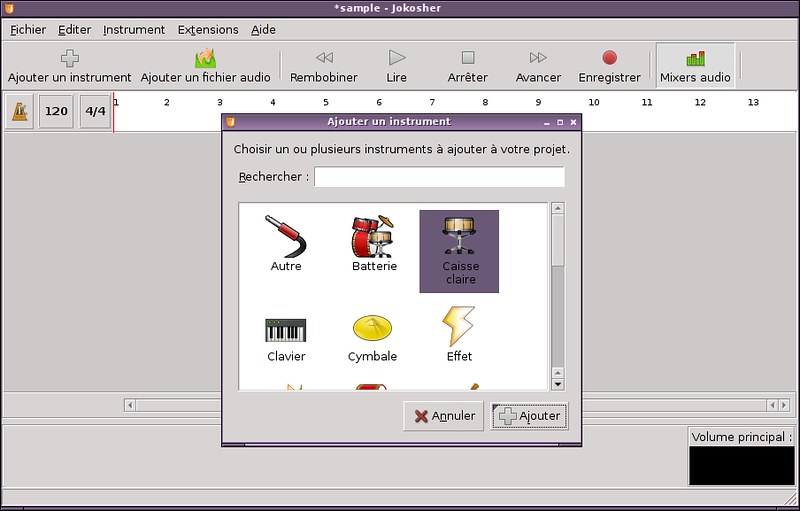
|
|
|
|
On a different level, [Jokosher][2] focuses more on the multi-track aspect for musical artists. Developed in Python and using the GTK+ interface with GStreamer for audio back-end, Jokosher really impressed me with its slick interface and its extensions. If the editing features are not the most advanced, the language is clear and directed to musicians. And I really like the association between tracks and instruments for example. In short, if you are starting as a musician, it might be a good place to get some experience before moving on to more complex suites.
|
|
|
|
### 3. Ardour ###
|
|
|
|
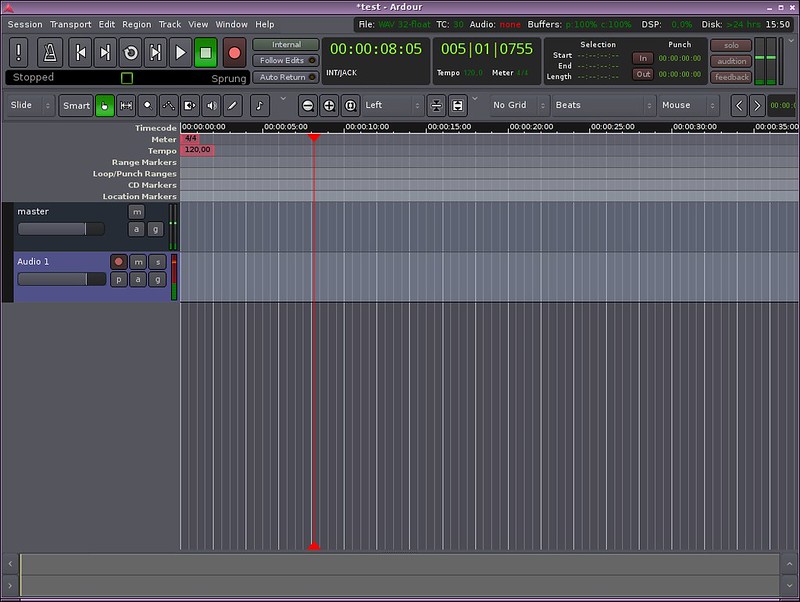
|
|
|
|
And talking about compex suites, [Ardour][3] is complete software for recording, editing, and mixing. Designed this time to appeal to all professionals, Ardour features in term of sound routing and plugins go way beyond my comprehension. So if you are looking for a beast and are not afraid to tame it, Ardour is probably a good pick. Again, the interface contributes to its charm, as well as its extensive documentation. I particularly appreciated the first-launch configuration tool.
|
|
|
|
### 4. Kwave ###
|
|
|
|

|
|
|
|
For all KDE lovers, [KWave][4] corresponds to your idea of design and features. There are plenty of shortcuts and interesting options, like memory management. Even if the few effects are nice, we are more dealing with a simple tool to cut/paste audio together. It becomes shard not to compare it with Audacity unfortunately. And on top of that, the interface did not appeal to me that much.
|
|
|
|
### 5. Qtractor ###
|
|
|
|

|
|
|
|
If Kwave is too simplistic for you but a Qt-based program really has some appeal, then [Qtractor][5] might be your option. It aims to be "simple enough for the average home user, and yet powerful enough for the professional user." Indeed the quantity of features and options is almost overwhelming. My favorite being of course customizable shortcuts. Apart from that, Qtractor is probably one of my favorite tools to deal with MIDI files.
|
|
|
|
### 6. LMMS ###
|
|
|
|
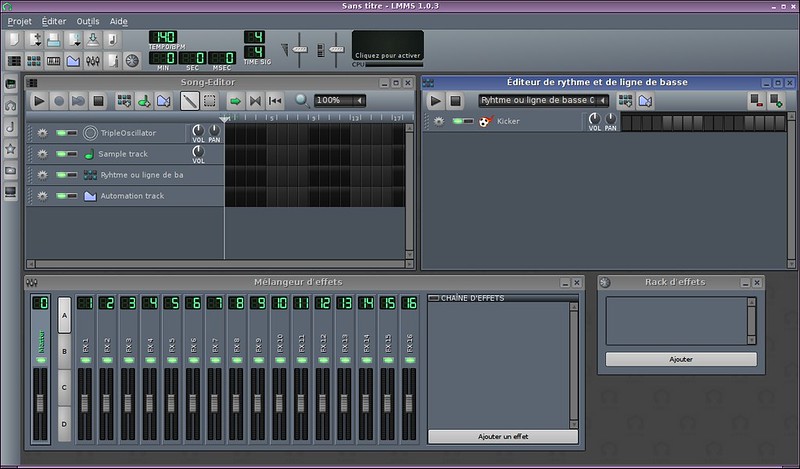
|
|
|
|
Standing for Linux MultiMedia Studio, LMMS is directly targeted for music production. If you do not have prior experience and do not want to spend too much time getting some, go elsewhere. LMMS is one of those complex but powerful software that only a few will truly master. The number of features and effects is simply too long to list, but if I had to pick one, I would say that the Freeboy plugin to emulate Game Boy sound system is just magical. Past that, go see their amazing documentation.
|
|
|
|
### 7. Traverso ###
|
|
|
|
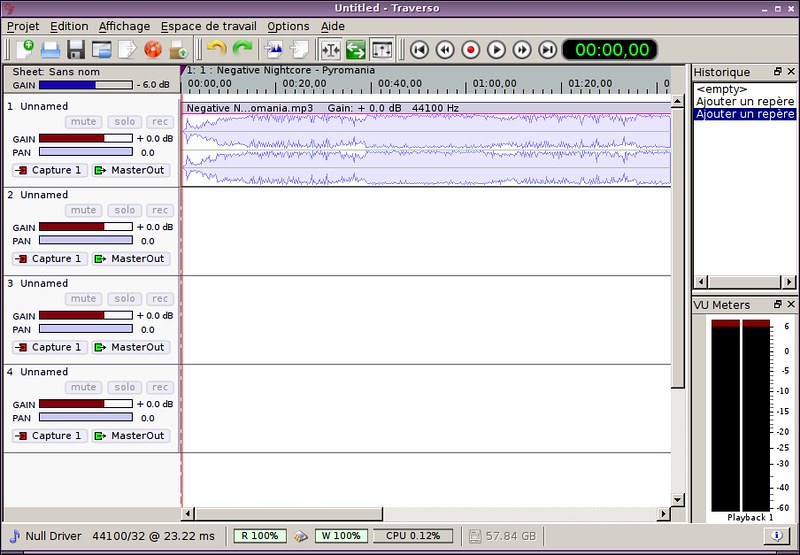
|
|
|
|
Finally, Traverso stood out to me for its unlimited track count and its direct integration with CD burning capacities. Aside from that, it appeared to me as a middle man between a simplistic software and a professional program. The interface is very KDE-like, and the keyboard configuration is always welcome. And cherry on the cake, Traverso monitors your resources and make sure that your CPU or hard drive does not go overboard.
|
|
|
|
To conclude, it is always a pleasure to see such a large diversity of applications on Linux. It makes finding the software that best fits your needs always possible. While my personal favorite stays Audacity, I was very surprised by the design of programs like LMMS or Jokosher.
|
|
|
|
Did we miss one? What do you use for audio editing on Linux? And why? Let us know in the comments.
|
|
|
|
--------------------------------------------------------------------------------
|
|
|
|
via: http://xmodulo.com/good-audio-editing-software-linux.html
|
|
|
|
作者:[Adrien Brochard][a]
|
|
译者:[译者ID](https://github.com/译者ID)
|
|
校对:[校对者ID](https://github.com/校对者ID)
|
|
|
|
本文由 [LCTT](https://github.com/LCTT/TranslateProject) 原创翻译,[Linux中国](http://linux.cn/) 荣誉推出
|
|
|
|
[a]:http://xmodulo.com/author/adrien
|
|
[1]:http://audacity.sourceforge.net/
|
|
[2]:https://launchpad.net/jokosher/
|
|
[3]:http://ardour.org/
|
|
[4]:http://kwave.sourceforge.net/
|
|
[5]:http://qtractor.sourceforge.net/qtractor-index.html
|
|
[6]:
|
|
[7]:
|
|
[8]:
|
|
[9]:
|
|
[10]:
|
|
[11]:
|
|
[12]:
|
|
[13]:
|
|
[14]:
|
|
[15]:
|
|
[16]:
|
|
[17]:
|
|
[18]:
|
|
[19]:
|
|
[20]:
|